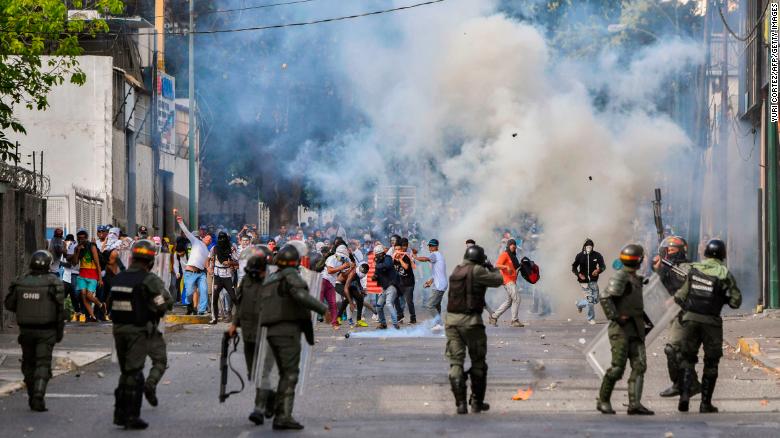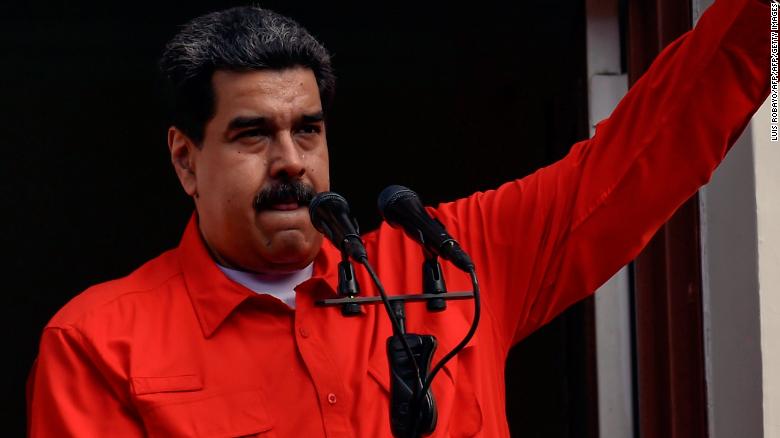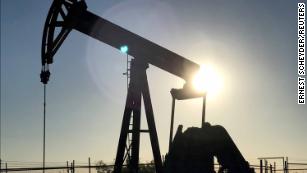Begin quote from:
How the chaos in Venezuela will impact oil prices
New York (CNN Business)The diplomatic relationship between the United States and Venezuela is in shambles -- and it hit a new low this week.Despite soaring tensions between the Trump administration and the regime of Nicolas Maduro, the two nations still share a crucial link: oil.The United States is Venezuela's biggest and most important oil customer, accounting for 39% of the OPEC nation's deliveries last year, according to ClipperData. And Venezuela was the fourth-biggest source of foreign oil that flowed into America last October.Now, that tight oil relationship is coming under enormous strain. The White House on Wednesday took the dramatic step of recognizing Venezuelan opposition leader Juan Guaido as the South American country's legitimate president. Maduro responded by breaking relations with the United States.More importantly for the oil market, President Donald Trump is considering taking a range of actions to punish Maduro, including possible oil sanctions, sources have told CNN.Sanctions on Venezuela's oil industry would deliver a staggering blow on the country's crashing economy, but also have important implications for the United States. The loss of Venezuelan barrels could drive up crude prices and squeeze American refineries that take in hundreds of thousand of barrels of Venezuelan oil each day."The US will be hurting itself if it does put these sanctions on Venezuela," said Matt Smith, director of commodity research at ClipperData.Oil is the 'lifeblood' of Venezuela's economy
Venezuela's oil output had already plunged to a 30-year low due to the rapid decay of its energy industry. RBC Capital Markets was calling for Venezuela's production to drop by up to half a million barrels per day in 2019. But RBC warned that US sanctions could cause that figure to increase by several hundred thousand additional barrels.Oil sanctions would deepen the economic chaos in Venezuela, which relies on oil exports for 90% of its revenue."The quickly devolving situation in Venezuela appears to be approaching some type of tipping point," Helima Croft, RBC's global head of commodity strategy, wrote to clients on Wednesday.Venezuela's other leading oil customers are China and India. But Venezuela doesn't get any cash for those oil shipments. The deliveries are made in exchange for payments towards Venezuela's massive debt."Sanctions would cut off the lifeblood of Venezuela's economy," said Smith.The country is already facing a humanitarian disaster. Venezuela's GDP has plunged by 37% between 2012 and 2017, according to the IMF. Inflation is projected to reach a stunning 10 million percent in 2019.Will Trump take tough stance?
The oil markets have had a muted reaction so far this week to the chaos in Venezuela. That's likely because it's very uncertain what happens next.Trump has been a wild card for the oil market for the past year. Fearing $100 oil, Trump took a softer-than-expected stance on Iran sanctions. That gentle approach left the oil market oversupplied, helping to send prices tumbling."There's a lot of doubt in the market that Trump will pull the trigger on oil sanctions" aimed at Venezuela, said Joe McMonigle, a former Energy Department official under President George W. Bush.But McMonigle, now senior energy policy analyst at Hedgeye Potomac Research, believes Trump is very likely to impose sanctions.He warned that sanctions raise the risk of a larger crisis, such as a civil war or a halt to the operations of Venezuela's state oil company."It could lead to all of its oil production going offline and chaos in the country," said McMonigle.US refiners rely on Venezuela's crude
Analysts said tough US penalties on Venezuela's oil industry would be bullish for prices.The problem is that even though US oil production has skyrocketed to record highs, America is not self-sufficient. Gulf Coast refiners can't operate on US shale oil alone. To churn out gasoline, jet fuel and other products, refineries require a healthy dose of heavy crude. They've come to rely on the cheap and extra heavy crude found in Venezuela.Tellingly, even though Venezuela's oil production has dropped sharply, the country still shipped 506,000 barrels per day to the United States in October, according to the most recent Energy Information Administration statistics. The only countries that sent more crude to the United States were Canada, Saudi Arabia and Mexico.US sanctions on Venezuela could increase the cost of heavy crude, dealing a setback to American refineries, analysts warned. They'll have to find heavy crude elsewhere.The biggest US importers of Venezuelan crude last year were Citgo, Valero (VLO) and Chevron (CVX), according to Rystad Energy. (Citgo is majority owned by PDVSA, Venezuela's state-owned oil company.)"Sanctions would make US Gulf Coast refiners the biggest loser," Rystad Energy analyst Paola Rodriguez-Masiu wrote in a report on Thursday.Chevron, which has operations in Venezuela, declined to comment on the situation there."Chevron operations in Venezuela continue and the company is committed to the country's energy development in compliance with all applicable laws and regulations," Chevron said in a statement.No speedy recovery even if Maduro exits
And Venezuela relies on US products to keep its oil industry afloat. Venezuela's crude is so heavy it must be blended with naphtha, a liquid hydrocarbon mixture used to dilute oil so that it can be transported.US sanctions could block the sale of US diluents to Venezuela. While Venezuela could find a substitute elsewhere, it would likely be more expensive and further away.It's unclear if the external pressure on Maduro will cause him to lose his grip on power. Senior military leaders in Venezuela have so far continued to back him and he's received support from Turkey, Russia and China as well.RBC's Croft cautioned that Venezuela's oil production could be sidelined for a long time even if Maduro's regime collapses."The road back for Venezuela will be extremely arduous given the depths of the economic and humanitarian disaster," she said.






















No comments:
Post a Comment